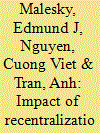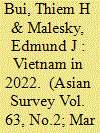| Srl | Item |
| 1 |
ID:
193650


|
|
|
|
|
| Summary/Abstract |
A growing body of evidence attests that legislators are sometimes responsive to the policy preferences of citizens in single-party regimes, yet debate surrounds the mechanisms driving this relationship. We experimentally test two potential responsiveness mechanisms—elections versus mandates from party leaders—by provisioning delegates to the Vietnamese National Assembly with information on the policy preferences of their constituents and reminding them of either (1) the competitiveness of the upcoming 2021 elections or (2) a central decree that legislative activities should reflect constituents’ preferences. Consistent with existing work, delegates informed of citizens’ preferences are more likely to speak on the parliamentary floor and in closed-session caucuses. Importantly, we find that such responsiveness is entirely driven by election reminders; upward incentive reminders have virtually no effect on behavior.
|
|
|
|
|
|
|
|
|
|
|
|
|
|
|
|
| 2 |
ID:
131505


|
|
|
|
|
| Publication |
2014.
|
| Summary/Abstract |
Comparative political economy offers a wealth of hypotheses connecting decentralization to improved public service delivery. In recent years, influential formal and experimental work has begun to question the underlying theory and empirical analyses of previous findings. At the same time, many countries have grown dissatisfied with the results of their decentralization efforts and have begun to reverse them. Vietnam is particularly intriguing because of the unique way in which it designed its recentralization, piloting a removal of elected people's councils in 99 districts across the country and stratifying the selection by region, type of province, and urban versus rural setting. We take advantage of the opportunity provided by this quasi experiment to test the core hypotheses regarding the decision to shift administrative and fiscal authority to local governments. We find that recentralization significantly improved public service delivery in areas important to central policy-makers, especially in transportation, healthcare, and communications.
|
|
|
|
|
|
|
|
|
|
|
|
|
|
|
|
| 3 |
ID:
158375


|
|
|
|
|
| Summary/Abstract |
International relations scholarship has made great progress on the study of compliance with international agreements. While persuasive, most of this work has focused on states’ de jure compliance decisions, largely excluding the de facto behavior of nonstate actors whose actions the agreement hopes to constrain. Of particular interest has been whether the OECD Anti-Bribery Convention (ABC) might reduce the propensity of multinational corporations (MNCs) to bribe officials in host countries through its mechanisms of extraterritoriality and extensive peer review. Unfortunately, research is hampered by reporting bias. Since the convention raises the probability of investors’ punishment for bribery in their home countries, it reduces both the incentives for bribery and willingness to admit to the activity. This generates uncertainty over which of these incentives drives any correlation between signing the convention and reductions in reported bribery. We address this problem by employing a specialized survey experiment that shields respondents and reduces reporting bias. We find that after the onset of Phase 3 in 2010, when the risk of noncompliance increased for firms subject to the OECD-ABC, those MNCs reduced their actual bribery relative to their nonsignatory competitors.
|
|
|
|
|
|
|
|
|
|
|
|
|
|
|
|
| 4 |
ID:
145717


|
|
|
| 5 |
ID:
190035


|
|
|
|
|
| Summary/Abstract |
Vietnam in 2022 was beset with numerous dramatic political developments and diplomatic uncertainties but also recorded significant economic achievements. Changes in the top echelons of power took place in an unprecedented manner due to the intensifying anticorruption campaign, exposing the malleability of elite Vietnamese governing institutions and shrinking the space for civil society organizations. Meanwhile, Vietnam was recognized for its outstanding recovery from the COVID-19 pandemic with remarkable economic performance. The country’s “bamboo diplomacy” was put under stress amid challenges caused by Russia’s invasion of Ukraine and the US–China strategic rivalry. Navigating the turbulence and uncertainty of domestic and international affairs while maintaining the momentum of economic recovery will be the main challenge for Vietnam in 2023.
|
|
|
|
|
|
|
|
|
|
|
|
|
|
|
|